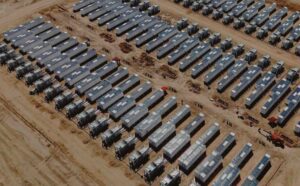Transmission network company Transgrid has entered the market to buy grid-scale battery services from third-party owner-developers, as it looks beyond poles and wires for a better and cheaper way to support the rapidly evolving New South Wales grid.
Transgrid says it is seeking services from two separate battery energy storage systems (BESS) to be installed at substations in the Bathurst, Orange and Parkes area, and in the NSW North West Slopes region.
Announcing the “doubly significant milestone” on Tuesday, Transgrid’s Marie Jordan said big batteries were identified as best way forward for the two network growth regions, after a “thorough assessment” of options.
“Our grid is changing, which is why we’re going beyond the traditional poles and wires approach and embracing new technologies,” said Jordan, Transgrid’s executive general manager of network.
“We’re looking to purchase services from providers who own and operate battery storage. This approach helps meet growing demand in both regions faster than upgrading the existing network.”
Jordan says the big batteries will provide dynamic reactive support to manage voltage variations on Transgrid’s network during high demand periods.
“These services will help us unlock extra capacity on the transmission network and use the existing network better and avoid interruptions to supply for consumers,” she says.
“The service providers can also use the batteries to trade in the energy market when not needed to support Transgrid’s network, so it’s a win win for the power system.”
Transgrid sees electricity demand in the Bathurst, Orange and Parkes region increasing substantially in the near future, with the planned connection of new industrial loads, along with general load growth.
The network giant says a Regulatory Investment Test for Transmission (RIT-T) found proposals from separate third parties for a grid-scale BESS outperformed the network-only solutions also assessed during the process, deferring the need for significant network upgrades.
For the Bathurst, Orange and Parkes region project, the RIT-T found two proposals from separate third
parties ranked as equal best options, each promising to deliver around $2.5 billion in net benefits.
“This marks a doubly significant milestone because when they were compared to other options grid scale batteries came out on top in both regions in terms of providing the biggest benefits,” Jordan says.
Transgrid plans to launch the competitive process in each region in August, following an online forum to brief potential suppliers on August 10. The aim is to have the batteries up and running by 2025.
Transgrid’s move to procure battery services over traditional network-only solutions comes as the network company faces a bill north of $10 billion for its planned transmission expansion projects, including the 1,600km Southern Superhighway made up EnergyConnect, HumeLink and VNI West.
Major poles and wires grid upgrades such as these are considered crucial and unavoidable to accommodate the sheer volume of new renewable energy capacity being built to replace coal dependent grids like that in NSW.
But more and more network companies – including distribution service providers – are looking to other options including battery storage as an alternative option to network-only solutions.
“In terms of … what are we doing on the distributed network side, our fundamental view is that there is actually now a critical need for storage,” CitiPower Powercor and United Energy’s Greg Hannan told Australian Energy Week last month.
“We’re now starting to see storage as part of the fundamental energy ecosystem.”
See also: NSW gives planning OK to two new big batteries in key renewable zones










